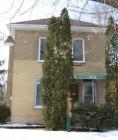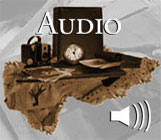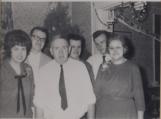1
The house at 875 Armour Road, where Clair lived from birth until he was a few months old.23 February 2006
875 Armour Road, Peterborough, Ontario, Canada

2
Clair Leahy was born in 1942 when his family was living at 875 Armour Road (which was called River Road at the time). When he was a few months old they moved to 639 Armour Road where they lived until he was 6. They then moved to 138 Douro Street just in time for Clair to start grade one. The school didn't have kindergarten classes. It was while he was living at this house he remembers most of his childhood memories. Clair is one of four children. There were three boys and one girl in his family. He would spend all of his childhood years growing up in what is known as East City.3
The house at 639 Armour Road where Clair lived from the time he was a few months old until he was 6.23 February 2006
639 Armour Road, Peterborough, Ontario, Canada

4
Clair's father, James Leahy, worked at the Sanitary Ice Plant for about 10 to 15 years. The ice plant where his father worked was on Water Street, just north of the house where his mother, Clara (O'Toole) Leahy, grew up at 826 Water (north of Argyle, approximately where Deeth and White is today). The ice was made at the plant and delivered by horse and later on in ice trucks. Reg Turner, who owned the ice plant, was quite affluent and able to be at the ‘avant garde' of doing things like buying trucks.There were no refrigerators in people's homes. They would put the ice in the top of the ice box and that would keep the food cold. You would have to do that again the next day. The ice man would put a burlap bag on his shoulder so he wouldn't get a lot of arthritis from carrying the ice. There were tongs they would lift the ice with. Most ice was in 25 pound blocks, but there were some 50 pound blocks as well. They would deliver the ice several times a week. Clair's father sometimes worked in the plant but mostly he delivered the ice. The ice sold for 25 cents. His mom would roll the quarters, put the money in the bottom of the carriage and take them to the bank. It was great fun for kids to follow the trucks to get the ice that fell out of the back.
During the war the ice plant had a contract to supply ice to the hospitals. The hospitals needed 100 pounds of ice to start an oxygen tent and 50 pounds to continue the tent the next day. A hospital would call at whatever hour of the day or night they needed to start the oxygen tent. The patient had to pay for the ice as well as the hospital stay. In winter the ice plant worked in coal and firewood.
5
Clair Leahy talks about helping his father out at work.28 March 2006
Peterborough, Ontario, Canada

6
Clair's father also worked for Sunshine Dairy where he was a stableman looking after the horses. Clair would go with him as often as possible to help care for the horses. The milk was delivered by horse at 6 am every morning except Sunday. When the milk run was finished the horses would have to be looked after – fed, oats and hay, watered, etc.Clair also remembers ploughing fields with his father. His father owned a "democrat" (a horse and wagon) as well as a plough and a harrow.
8
When asked if his parents had any specific expectations of their children, Clair related that his father only went to grade 3 and his idea was that one should get a job as quickly as possible after school was done and try to earn some money as a form of security. According to Clair, he was very wise. He doesn't know if his father anticipated that one son would become a priest and his daughter a nun. A university education was not something that was expected. He felt it was more important to get a job first, rather than put energy into getting a degree.9
Clair talks about watching and playing sports and how kids made their own fun.28 March 2006
Peterborough, Ontario, Canada

10
Sports would play a huge role in Clair Leahy's childhood and adult life. Baseball was especially important. Clair remembers that Percy Harrison operated a chip wagon at the Bowl. He parked on Burnham Street and sold chips in a paper cone. Back then the lights of the ball diamond were operated by a lever. Kids could switch them on and play whenever they wanted.11
This is the front cover of book The Windmill Pitch that Clair Leahy wrote about pitching.1982
Peterborough, Ontario, Canada

12
Clair started watching baseball at the East City Bowl when he was 6 years old. His hero was Ray Judd who he saw pitch at the bowl. Because of Judd "everyone wanted to be a windmill pitcher". He started young at the park, sitting behind the screen watching people play. Ray Judd was a kind man willing to share his secrets with others. He taught Clair to pitch and eventually Clair even pitched a game against him.The Windmill Pitch is a book written by Clair. Clair was taught to pitch by a Mormon missionary from the US, Ray Judd who Clair considers him to be the best pitcher in the world. When Clair was asked by the YMCA to put on a pitching clinic he decided to write a book so that people could get the same lessons in pitching that he received. In his clinics he uses the method from his book. He doesn't believe that it is a matter of having a special talent, but instead, it's about getting the proper technique. For 26 years now he has been teaching a pitching clinic for the YMCA every April. Each season he has about 20 students between the ages of 8 and 15 years take lessons. He feels he is passing on what he learned to kids today.
13
Clair Leahy in his baseball uniform. Clair is well known in Peterborough for his pitching skills.1982
Peterborough, Ontario, Canada

14
As a result of his childhood fascination with the game, Clair has had a lifelong association with baseball. In 1994 he was inducted into the Peterborough Sports Hall of Fame for his fast pitch. He is in the Hall of Fame because he pitched in the men's league for many years. Starting in high school he got a team from Peterborough together. Later the Eastern Ontario fastball league was instrumental in putting a team together and he pitched for them. Clair considers himself fortunate to have been on a lot of good teams with good players and wonderful sponsors. He made a lot of friends and has good memories of his time in the game.He announces the men's fast ball league on Thursday nights at East City Bowl and writes a regular column on the sport for Peterborough This Week.
According to Clair his success in sports was a journey not a destination and the journey was certainly worthwhile. Going to the ballpark paid off. He still goes today and still sits in the same seat as he did in the 1940s.
